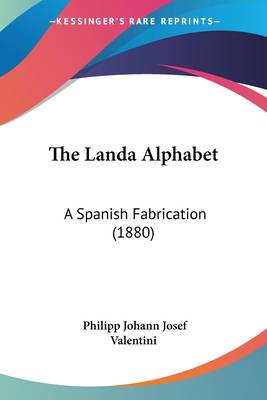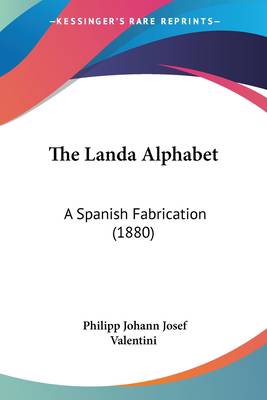
- Retrait gratuit dans votre magasin Club
- 7.000.000 titres dans notre catalogue
- Payer en toute sécurité
- Toujours un magasin près de chez vous
- Retrait gratuit dans votre magasin Club
- 7.000.000 titres dans notre catalogue
- Payer en toute sécurité
- Toujours un magasin près de chez vous
The Landa Alphabet
A Spanish Fabrication (1880)
Philipp Johann Josef Valentini
Livre broché | Anglais
31,45 €
+ 62 points
Format
Description
The Landa Alphabet: A Spanish Fabrication (1880) is a book written by Philipp Johann Josef Valentini that explores the origins and history of the Landa alphabet, a writing system used by the Maya people of Mesoamerica. The book argues that the Landa alphabet, which was first described by the Spanish bishop Diego de Landa in the 16th century, was not a genuine creation of the Maya but rather a fabrication by the Spanish conquerors. Valentini examines the historical and cultural context of the Landa alphabet, drawing on a range of sources including archaeological evidence, colonial records, and linguistic analysis. He argues that the alphabet was created by Spanish missionaries as a means of converting the Maya to Christianity, and that it was not widely used or understood by the Maya themselves. The book also explores the broader implications of the Landa alphabet for the study of Maya culture and history, and raises important questions about the role of colonialism and cultural appropriation in the creation and dissemination of knowledge. Overall, The Landa Alphabet: A Spanish Fabrication is a fascinating and thought-provoking work that sheds new light on an important aspect of Mesoamerican history.This scarce antiquarian book is a facsimile reprint of the old original and may contain some imperfections such as library marks and notations. Because we believe this work is culturally important, we have made it available as part of our commitment for protecting, preserving, and promoting the world's literature in affordable, high quality, modern editions, that are true to their original work.
Spécifications
Parties prenantes
- Auteur(s) :
- Editeur:
Contenu
- Nombre de pages :
- 134
- Langue:
- Anglais
Caractéristiques
- EAN:
- 9781120960702
- Date de parution :
- 29-01-10
- Format:
- Livre broché
- Format numérique:
- Trade paperback (VS)
- Dimensions :
- 152 mm x 229 mm
- Poids :
- 190 g







